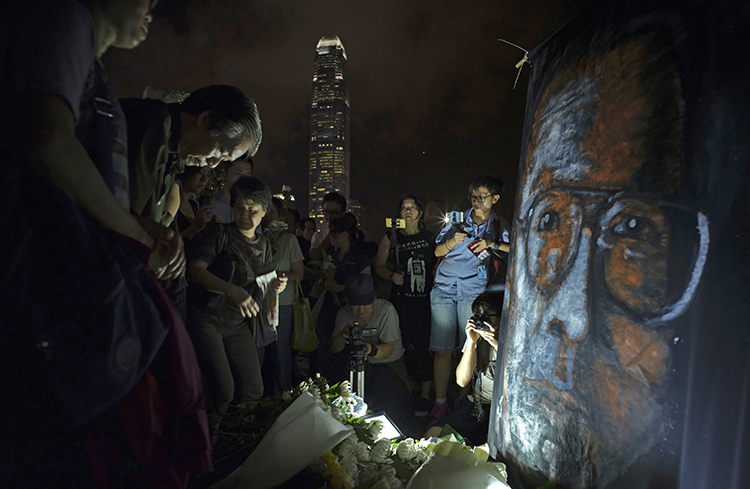Four months after Nobel laureate Liu Xiaobo died of liver cancer shortly after his release from jail on medical parole, the writer and journalist Yang Tongyan died under similar circumstances in a Shanghai hospital. Like Liu, Yang had been seriously ill for several years, but Chinese authorities granted him medical parole only three months before his death.
Yang, who wrote under the name Yang Tianshui, was diagnosed with tuberculosis and diabetes as early as 2009, and a brain tumor in August 2017. His family and friends pleaded repeatedly for the journalist to receive better medical care and be released on medical parole, according to Radio Free Asia’s interview with Yang’s sister Guixiang, and the human rights website Weiquanwang. But authorities rejected their applications until it was too late. Yang died in November, aged 56.
The repeated denial of medical care to journalists and other political prisoners is, in effect, a slow death sentence.
Since 2013, at least seven dissidents and journalists, including Yang and Liu, have died in custody or shortly after being freed, after authorities repeatedly denied them proper medical treatment, according to a November report by Human Rights Watch.
At least eight other jailed journalists who are included in CPJ’s 2017 prison census are in need of proper medical attention:
Huang Qi, founder of the human rights news website 64 Tianwang, has kidney and heart disease, and two tumors on his chest and stomach, according to Chinese Human Rights Defenders. Huang, who is included in CPJ’s Free the Press campaign, has spent more than eight years in prison at various times in the past two decades for reporting on protests, government corruption, and human rights abuses. Since his latest arrest on November 28, 2016, Huang has been denied medical treatment and fellow inmates beat him with the encouragement of prison guards, Huang’s lawyers told CPJ. Authorities in Mianyang City, where the journalist is detained, have rejected medical parole applications filed by Huang’s lawyers.
Wang Jing, who reports for 64 Tianwang, was diagnosed with brain tumors earlier this year. A court in Jilin sentenced Wang to four years and 10 months in prison on April 24, 2016 for “picking quarrels and provoking trouble.” Wang’s mother told Radio Free Asia that her daughter’s face is half-paralyzed due to the tumors and that she has hallucinations. Authorities took Wang to hospital for a check-up in early 2017 but did not allow her to receive any treatment, Wang’s mother said. The journalist’s medical parole application is still pending.
Freelancer Lü Gengsong, who is serving 11 years in Zhanghu prison, in Huzhou province, has a gallbladder disease, diabetes, and high blood pressure, according to Radio Free Asia. Lü, who was convicted of subversion in June 2016 for publishing articles on corruption, organized crime, and other topics, has lost six teeth and a significant amount of weight in prison, according to media reports. Authorities denied a request for medical parole filed by Lü’s lawyer, according to Radio Free Asia.
Since he was jailed in 2013, Hong Kong publisher Yiu Man-tin, has had five heart attacks, according to a letter that the 17 opposition Hong Kong Democratic Party members sent to China’s President Xi Jinping, calling for the publisher’s release. Yiu, who is serving a 10-year prison sentence for “suspicion of smuggling ordinary goods” in 2013, was arrested as he prepared to publish Chinese Godfather Xi Jinping, a book by the exiled author Yu Jie, according to Hong Kong Free Press and Radio Free Asia. Authorities refused to permit Yiu’s nephew to provide a guarantee for his release on medical parole, Hong Kong Free Press reported.
Other jailed journalists included in CPJ’s 2017 census who are in need of immediate medical help include Lobsang Jamyang, a Tibetan writer and blogger detained in Mianyang prison; Niyaz Kahar, a reporter and blogger jailed in Shikho prison; Kunchok Tsephel Gopey Tsang, founder of the Tibetan cultural issues website Chomei, who has leg and hip pain; and Ding Lingjie, editor of human rights news website Minsheng Guancha, who has hyperostosis, a bone growth disorder.
China’s Ministry of Foreign Affairs has rejected international criticism that it mistreats jailed journalists when asked about the issue at press briefings. And, when U.N. High Commissioner for Human Rights Zeid Ra’ad Al Hussein released a statement expressing sorrow at Liu’s death, the ministry said that the U.N. should respect the country’s judicial sovereignty. The ministry added that all agencies involved in Liu’s case followed rules and human rights doctrines, and provided the medical treatment that the journalist needed, according to reports.
